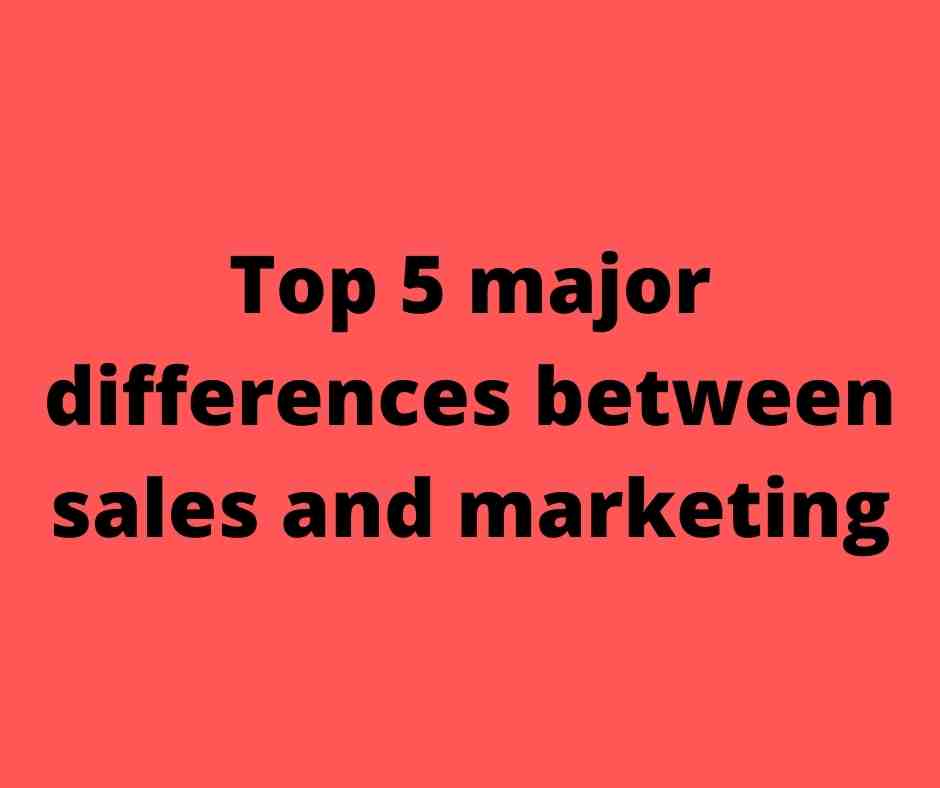Sales and marketing are two of the most important functions in any organization, but they can also be two of the most different. In this article, we’ll read about the top 5 differences between sales and marketing.
Here are the top five major differences between sales and marketing
Sales are all about closing deals, while marketing is all about creating demand.
One of the biggest difference between sales and marketing is that sales are all about closing deals and making sure that the products or services that you’re selling are actually being purchased by customers. Marketing, on the other hand, is focused on creating demand for a product or service. In order to do this, marketing teams must carry out extensive research to figure out what potential customers want and then craft campaigns that will convince them to buy whatever it is that they’re selling. So, in short, sales is all about getting customers to actually purchase something while marketing is about generating interest in a product or service and convincing people to buy it.
Sales are focused on short-term results, while marketing is focused on long-term results.
Because sales are about making money in the short term, while marketing is about building a brand for the long term.
Sales are all about meeting or exceeding your quarterly or annual targets. This means that you need to focus on closing deals and bringing in new business as quickly as possible. Marketing, on the other hand, is all about creating a strong foundation for future growth. It’s not always going to be easy to see results in the short term, but if you do things correctly, you’ll reap the rewards down the road.
Sales are reactive, while marketing is proactive.
There are a few key reasons why Sales are reactive, while marketing is proactive. First, marketing is focused on building awareness and interest in a product or service, whereas sales is focused on converting that interest into customers.
Marketing is also generally more strategic in nature, planning for the long term growth of a company, while Sales is more tactical, focusing on achieving specific goals within a set timeframe. Finally, marketing initiatives typically require less investment than Sales initiatives (although this obviously varies depending on the company and product/service in question). All of these factors contribute to making marketing more proactive by its very nature.
Sales focus on individual customers, while marketing focuses on groups of customers.
Sales focus on individuals because they need to understand what each person wants and needs in order to close a sale. Marketing, on the other hand, focuses on groups of customers because it’s more efficient and effective to target large groups of people who share certain characteristics (like age, gender, location, etc.). This way, marketers can create content that resonates with those groups and convince them to buy from the company.
Sales are often seen as a necessary evil, while marketing is often seen as a strategic advantage.
There are a few reasons why Sales are often seen as a necessary evil. The first reason is that Sales can be very pushy and aggressive, which can make people uncomfortable. The second reason is that Salespeople often have to make tough calls and deals, which can lead to them being seen as ruthless or even evil. And the third reason is that Sales can be seen as a necessary expense, rather than an investment in the company. You can boost your sales effort by targeting leads that are relevant to your business. Many companies CEO’s use a sales crm to boost their sales.
However, it’s important to remember that Sales are an essential part of any business. After all, it’s the Sales team that brings in new customers and helps to grow the company. So while there may be some negative aspects to Sales, it’s still an important role within any organization.
Marketing can be seen as a strategic advantage because it allows companies to understand their customers and their needs. Additionally, marketing can help create a competitive edge by positioning a company’s products and services in a favourable light. Finally, marketing helps companies track their performance and measure the effectiveness of their campaigns.
Why aligning the sales and marketing department is important for lead generation?
First, if the two departments are not on the same page, it can lead to confusion among potential leads about who they should be contacting and what they should be expecting from the company. This can ultimately lead to lost opportunities and decreased conversion rates.
Second, if sales and marketing are not working together efficiently, it can result in a mismatch between what each department is doing. The marketing team might generate a lot of leads, but if the sales team isn’t properly equipped to follow up with them or close them, all those leads will be for nothing.
Differences between sales and marketing: To sum up
So, what have we learned? The main difference between sales and marketing is that marketing is all about creating a relationship with the customer, whereas sales is focused on closing the deal. Marketing establishes trust and credibility with potential customers, which makes them more likely to buy when the time comes. Salespeople need to be good at quickly identifying needs and wants in order to close the sale. It’s important for both teams to understand their role in the overall process so that everyone can work together cohesively and achieve desired results. We hope this article on difference between sales and marketing was helpful.
